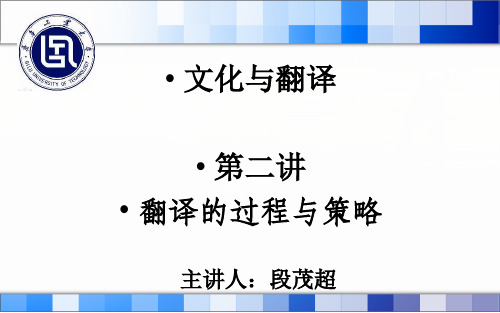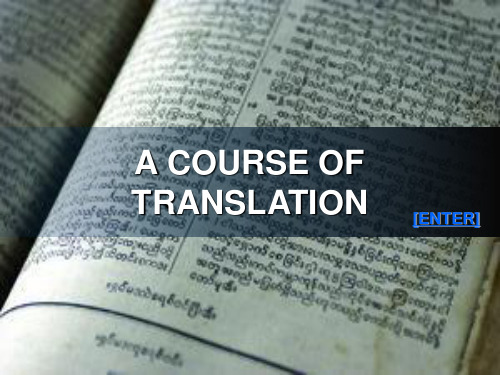第二讲 翻译
合集下载
第二讲:翻译的过程与策略解析

Examples:
• ① A:How often do you eat here, David? B:I eat here a lot. 应译为:“你多久来这吃一次啊,大卫 ?我经常来这吃。”如果把 “a lot”直译为“许多 ”或“很多很多”,这句话就不通顺了。 • ② A: All his geese are swans.? B: John is really such a person.应译为:“他老是言过其实么?约翰 就是这样一个人”。如果译成“他养的鹅都是天 鹅。”,那听上去就会莫名其妙了。 • ③ It is an ill bird that fouls its own nest. 家丑不可 外扬。
• ×管理人员面对的是商界前所未有的种种 现实,诸如就业的模式不断变化 包括外购 。重组等现象的猛增。 【译文】 管理人员面对的是商界前所未有 的种种现实,诸如企业用工方式的不断变 化 包括大幅度增加外部采办和新建联产单 位
• (2). 语言与周围经验世界的关系 • Were it left to an American to decide whether they should have a government without newspapers or newspapers without a government,he should not hesitate a moment to prefer the latter.
• 直译
• • • • • • • • A life line The Trojan horse The domino theory Dollar diplomacy A wolf in sheep’s clothing A trump card An ivory tower Man proposes, God disposes
商务英语翻译(第二讲)

investment in the infrastructure industry will not (at least in the short term) bring high economic
benefits.③ It is imperative to orient the investment to enterprises with better economic benefits, but
ห้องสมุดไป่ตู้
• 如果一方违反任何其根据第18.1条所作的陈述或担保,则另一方除 根据本合同或使用法律寻求任何可能的其他救济之外,违约方应当 赔偿另一方或合营公司因此种违约行为而招致的任何损失、损害、 费用、开支、责任或索赔。
• (分析:英语合同文本中的长句首先要仔细分析句子的内部结构, 判断句子是简单句、并列句、复合句,还是并列复合句。其次是找 出句中的主要成分,即主语和谓语动词。)
• 例2: Online culture thinks highly of the notion that the information flowing onto the screen come there by specific request.
• 在线文化赞赏这样的主张:不经用户特别请求,别把广告发到用户 的屏幕上。
• 例: Monetarists, led by University of Chicago Professor Emeritus Friedman armed themselves with evidence showing that free markets on their own produce as much growth and employment as an economy can sustain.
第二讲翻译学的基本概念

• 宁信而不顺(鲁迅语) rather to be faithful than smooth (“I’d rather be faithful than smooth”) • 神似(傅雷语) spiritual resemblance • 化境(钱钟书语)sublimation(升华) • 信、达、切(刘重德语)faithfulness, expressiveness and closeness (to the original style) • 三美: 音美, 形美, 意美(许渊冲语)the three beauties: beauty in sound, beauty in form and bea• •
选词diction 补偿compensation 视点转换shift of perspective 套译/仿译/仿拟imitation 信/忠实faithfulness/ 达/易懂intelligibility/expressiveness 通顺smoothness 流畅fluency 自然naturalness /idiomaticity(语言的表达习惯) 雅/优美elegance/gracefulness
• • • • • • • • •
东方语言Oriental languages 西方语言Occidental languages 佛经Buddhist Scriptures/sutra['su:trə] 梵语Sanskrit 鸠摩罗什Kumarajiva 泰特勒(Alexander Fraser )Tytler 奈达(Eugene A.) Nida 机器翻译machine translation(MT) 人工智能artificial intelligence(AI)
注意:英译汉中长句化短即采用分译法的 依据是:英语多用长句,汉语多用中短 句。长句化短要根据翻译实际需要为转 移。
第二讲:词汇翻译(上)

词汇翻译技巧 3.介词增减:英译汉时很多介词可以省略, 3.介词增减:英译汉时很多介词可以省略,汉译英时 介词增减
则需根据英语的行文需要增加适当的介词。 则需根据英语的行文需要增加适当的介词。
1)She was one of my colleagues at the ) university at which I taught. 她是我任教的那所大学的同事。 她是我任教的那所大学的同事。 2)I get positively angry with the ) impertinence of it and the everlastingness. 这么卤莽无礼,没完没了,真让我生气。 这么卤莽无礼,没完没了,真让我生气。 3)他已经把这事忘得一干二净了。 )他已经把这事忘得一干二净了。 He has forgotten all about it. 4)接到信时我高兴得跳了起来。 )接到信时我高兴得跳了起来。 I jumped with joy when I received the letter.
词汇翻译技巧 移植法 直接移植:在译文中将原文的词语原封不动地 直接移植: 挪用过来。如“卡拉 厅”、KTV包房 、“BP 挪用过来。 卡拉OK厅 、 包房”、 卡拉 包房 唱盘”、 光片 光片”、 发了一份 发了一份e-mail”、 机”、“CD唱盘 、“X光片 、“发了一份 、 唱盘 、 “进入 进入WTO”、“Word文件”、“如何执行 进入 、 文 、 如何执行 Windows 2000的应用程序”、“股票ABC”、 2000的应用程序 的应用程序”、“股票 股票ABC”、 NBA、CIA、IBM、IQ、EQ等等,汉语短语或句 等等, 、 、 、 、 等等 子中夹杂的这些英语单词就是直接移植过来的。 子中夹杂的这些英语单词就是直接移植过来的。 直接移植似乎多应用于科技翻译和新闻媒体 文学翻译则少见。 中,文学翻译则少见。
英汉互译第二讲

2.2 中英思维方式对比
2.2.1中国人注重伦理(ethics);英美人注重认 知(cognition)
“以儒家为代表的先哲对世界的认识主要不是出于对自然 奥秘的好奇,而是出于对现实政治和伦理道德的关注”。 儒家思想“关心的是人道,而非天道,是人生之理,而非 自然之性”。 而海洋性地理环境中发展起来的英美文化促使英美人对天 文地理的浓厚兴趣,使他们形成了探求自然的奥秘,向自 然索取的认知传统。
依据不同的标准,文化分类也林林总总。 从地域分,有本土文化和外来文化、城市文化和农村文化、东方文化和 西方文化、大陆汉文化和港澳台汉文化等; 从时间分,由原始文化、奴隶制文化、封建文化、资本化、道教文化、基督教文化、伊斯兰教文化等; 从生产方式分,有游牧文化、农业文化、工业文化、信息文化等; 从生产工具分,有旧石器文化、新石器文化、青铜文化; 从人类把握世界的方式分,有科学文化和人文文化; 从性质分,有世界文化、民族文化、精英文化、通俗文化等; 从结构层次分,有物质文化、制度文化、精神文化等。
二、习俗的差异 汉英习俗的差异是多方面的。如对狗的态度:狗在汉语文 化中是一种卑微的动物,与狗相关得表达一般含有贬义, 如“走狗、狗腿子、狗东西、癞皮狗、狗急跳墙、狗仗人势、 狗眼看人低、狼心狗肺”等。 英语文化中人们则欣赏狗的勇敢和忠诚, 如“a lucky dog(幸运儿)”、“Love me, love my dog(爱屋及 乌)”、“Every dog has his day(凡人皆有得意日)”等。 又如颜色方面,中国人喜爱红色,认为它代表热情、喜悦 和兴旺。传统中国婚礼上新娘子总是红色的奇葩,以示吉利; 新房也必由大红“喜”字 但英美文化中红色常与暴力、流血和战争有关。 因而为避免读者误解,著名翻译家David Hawkes不但把 《红楼梦》翻译成“The story of the stone”,还将全书的 “红”字都译为“green”。同样的差异还体现在白色、绿色 等颜色上。
重要的翻译理论

1. 无生命主语句的类型 2. 无生命主语句的译法 3. 翻译段落练习
第十五讲 Metaphor的翻译
一、教学目的:了解和掌握修辞的翻译方法。 二、教学过程:
1. Metaphor 的界定与概念 2. Metaphor 的翻译原则与译法 3. 翻译段落练习
第一讲
翻译原则简介
第一讲
翻译原则简介
[<]
Hale Waihona Puke [1][2][3][4]第一讲
翻译原则简介
[<]
“The receptors of the translated text could respond to it with comprehension and appreciation in essentially the same manner and to the same degree as the original receptors of the message”; “Translation should arouse the same feeling in its receptors as the feeling of the readers of the original”---- Nida For instance: as white as snow 通常译为白如 雪 / 但没有见过雪的人可以将其翻译为“白 如白鹭毛”,以达到功能对等的目的。 Spring up like mushrooms---雨后春笋 Everybody's business is nobody's business. [1][2][3][4] 三
严 复 : 信 达 雅 — faithfulness/expressiveness/elegance. The “three character guide” is regarded as a plumb-line of long standing to measure the professional level of translating. 傅 雷 : 神 似 —spiritual conformity, Emphasizing the reproduction of the spirit of the flavor of the original. 强调原作神韵 再现。
第十五讲 Metaphor的翻译
一、教学目的:了解和掌握修辞的翻译方法。 二、教学过程:
1. Metaphor 的界定与概念 2. Metaphor 的翻译原则与译法 3. 翻译段落练习
第一讲
翻译原则简介
第一讲
翻译原则简介
[<]
Hale Waihona Puke [1][2][3][4]第一讲
翻译原则简介
[<]
“The receptors of the translated text could respond to it with comprehension and appreciation in essentially the same manner and to the same degree as the original receptors of the message”; “Translation should arouse the same feeling in its receptors as the feeling of the readers of the original”---- Nida For instance: as white as snow 通常译为白如 雪 / 但没有见过雪的人可以将其翻译为“白 如白鹭毛”,以达到功能对等的目的。 Spring up like mushrooms---雨后春笋 Everybody's business is nobody's business. [1][2][3][4] 三
严 复 : 信 达 雅 — faithfulness/expressiveness/elegance. The “three character guide” is regarded as a plumb-line of long standing to measure the professional level of translating. 傅 雷 : 神 似 —spiritual conformity, Emphasizing the reproduction of the spirit of the flavor of the original. 强调原作神韵 再现。
第二讲 中西方翻译简史

Lecture 2 Translation History in China and the West 中西方翻译简史
教学目标
1.让学生了解中西方基本翻译理论。
2.让学生了解中西方翻译理论的发展现状。
3.讲评翻译作业、做翻译课堂练习。
教学重点、难点
1.中国翻译家的翻译理论与翻译观点。 2.西方翻译家的翻译理论与翻译观点。
• 佛经翻译须合乎原文本意,主张“尽从实录,按
本而传,不令有损言游字”,明确提出了“敬顺
圣言,了不加饰”的直译原则,主张严格的直译。
鸠摩罗什VS真谛VS彦琮 提倡意译,主张在存真的原则指导下,不妨“依 实出华”,讲究译文的流畅华美,因此他所译的 佛经都富于文学趣味,一直受到中国佛教徒和文 学爱好者的广泛传诵。他虽然倾向意译,但在实 践上基本仍然是折中而非偏激的。 • 真谛三藏到中国后20余年适逢兵乱,于颠沛流离 中仍能译出一百多部重要经论,是鸠摩罗什以后 玄奘以前贡献最大的译师。
and 2.5 billion more lack basic sanitation. If the status
quo continues, by the year 2025, half of the world’s
population, around 3 billion people will be living under water-stressed conditions, causing an increase in hunger, disease, preventable death and strife.
• 主要观点: • 译者应该像演说家一样,使用符合古罗马语言习 惯的语言来表达外来作品的内容。 • 直译是缺乏技巧的表现。翻译应保留词语最内层 的东西,即意思。 • 翻译也是文学创作。 • 各种语言的修辞手段彼此相通,因此翻译可以做 到风格对等。 • 提出“解释员”式翻译和“演说家”式翻译,即 直译与意译。
教学目标
1.让学生了解中西方基本翻译理论。
2.让学生了解中西方翻译理论的发展现状。
3.讲评翻译作业、做翻译课堂练习。
教学重点、难点
1.中国翻译家的翻译理论与翻译观点。 2.西方翻译家的翻译理论与翻译观点。
• 佛经翻译须合乎原文本意,主张“尽从实录,按
本而传,不令有损言游字”,明确提出了“敬顺
圣言,了不加饰”的直译原则,主张严格的直译。
鸠摩罗什VS真谛VS彦琮 提倡意译,主张在存真的原则指导下,不妨“依 实出华”,讲究译文的流畅华美,因此他所译的 佛经都富于文学趣味,一直受到中国佛教徒和文 学爱好者的广泛传诵。他虽然倾向意译,但在实 践上基本仍然是折中而非偏激的。 • 真谛三藏到中国后20余年适逢兵乱,于颠沛流离 中仍能译出一百多部重要经论,是鸠摩罗什以后 玄奘以前贡献最大的译师。
and 2.5 billion more lack basic sanitation. If the status
quo continues, by the year 2025, half of the world’s
population, around 3 billion people will be living under water-stressed conditions, causing an increase in hunger, disease, preventable death and strife.
• 主要观点: • 译者应该像演说家一样,使用符合古罗马语言习 惯的语言来表达外来作品的内容。 • 直译是缺乏技巧的表现。翻译应保留词语最内层 的东西,即意思。 • 翻译也是文学创作。 • 各种语言的修辞手段彼此相通,因此翻译可以做 到风格对等。 • 提出“解释员”式翻译和“演说家”式翻译,即 直译与意译。
第二讲 翻译历史概述

第二讲
翻译历史概述
2011-03-13
History is the memory of things said and done. Carl L. Becker 历史是一面镜子,也是一本深刻的教科书。 廖沫沙
Hale Waihona Puke 一、西方翻译史概述1、公元前3世纪中叶,罗马对希腊古典作品的译介 2、4-6世纪(罗马帝国后期至中世纪初期),《圣经》翻 译 3、9-10世纪,叙利亚学者用阿拉伯文翻译希腊典籍 3、11-13世纪(中世纪中期),西班牙托莱多的转译活动 4、14-16世纪(文艺复兴时期),翻译作品涉及各个领域, 产生大批杰出译家译作 5、17世纪下半叶至20世纪上半叶,继续翻译古典译作,开 始对西方近当代作品以及东方文学的翻译 6、1945年至今(二战以后至今),翻译从范围、规模、作 用直至形式,都与过去发生了很大的变化,机器翻译 出现。
汉英对照词汇表
佛经 Buddhist scriptures 佛经翻译 Buddhistic translation 音译 transliterate, transliteration 意译 free translation, liberal translation, paraphrase 译场 workshops for translation 梵文 Sanskrit 四书 Sishu, Ssu shu, the Four Books 五经 Wujing, the Five Classics 儒家学说 Confucianism 信达雅 faithfulness, expressiveness and elegance 马列著作 Marx and Lenin‘s Works,works of Marxism-Leninism 《毛泽东选集》Selected Works of Mao Zedong
翻译历史概述
2011-03-13
History is the memory of things said and done. Carl L. Becker 历史是一面镜子,也是一本深刻的教科书。 廖沫沙
Hale Waihona Puke 一、西方翻译史概述1、公元前3世纪中叶,罗马对希腊古典作品的译介 2、4-6世纪(罗马帝国后期至中世纪初期),《圣经》翻 译 3、9-10世纪,叙利亚学者用阿拉伯文翻译希腊典籍 3、11-13世纪(中世纪中期),西班牙托莱多的转译活动 4、14-16世纪(文艺复兴时期),翻译作品涉及各个领域, 产生大批杰出译家译作 5、17世纪下半叶至20世纪上半叶,继续翻译古典译作,开 始对西方近当代作品以及东方文学的翻译 6、1945年至今(二战以后至今),翻译从范围、规模、作 用直至形式,都与过去发生了很大的变化,机器翻译 出现。
汉英对照词汇表
佛经 Buddhist scriptures 佛经翻译 Buddhistic translation 音译 transliterate, transliteration 意译 free translation, liberal translation, paraphrase 译场 workshops for translation 梵文 Sanskrit 四书 Sishu, Ssu shu, the Four Books 五经 Wujing, the Five Classics 儒家学说 Confucianism 信达雅 faithfulness, expressiveness and elegance 马列著作 Marx and Lenin‘s Works,works of Marxism-Leninism 《毛泽东选集》Selected Works of Mao Zedong
- 1、下载文档前请自行甄别文档内容的完整性,平台不提供额外的编辑、内容补充、找答案等附加服务。
- 2、"仅部分预览"的文档,不可在线预览部分如存在完整性等问题,可反馈申请退款(可完整预览的文档不适用该条件!)。
- 3、如文档侵犯您的权益,请联系客服反馈,我们会尽快为您处理(人工客服工作时间:9:00-18:30)。
9
1. 词汇中的文化差异
反映中国文化特有的事物和现象的词语,如‚盘
古‛、‚女娲‛、‚秀才‛、‚八股文‛、‚太 极拳‛、‚个体户‛等,虽然在英语里找不到意 义完全对等的词语,却不是语义转换的主要障碍, 通过阐释或注解总有办法把它们的意思解释清楚 并传达出去,所以上述词语只能属于概念意义的 空缺,而不列入本章所讲的文化意义。 文化意义是指词语意义之外的、能产生联想的内 涵意义。具有这类双重意义的词语往往构成翻译 的主要障碍,因为它们常常兼指多意,甚至以内 涵意义为主。这样的词语,虽然在英语里能找到 概念相同的词语,却可能出现文化含义的不对应 或假对应。
like a fowl and then went on walloping and kicking him till his nose and mouth were a bloody pulp.
老王和我算是柳家大院最‚文明‛的人了。‚文明‛
是三孙子。(老舍《柳家大院》)
Old Wang and I are considered the genteel folk in the
10
狗(鄙视) 龙(高贵) 红(喜庆) 白(丧服) 蓝(纯净)
dog(同情) dragon(凶恶) red(暴力) white(婚妙) blue(忧郁、淫秽)
黄(王权)
牧童(悠闲) 月亮(团圆) 宣传(中性词)
yellow(怯懦)
cowboy(冒险) moon(虚幻) propaganda(贬义词)
4
宗教文化特色
周瑞家的听了笑道:‛阿弥陀佛,真坑死人的事儿!等十年
都未必这样巧的呢。‛ (曹雪芹《红楼梦》) 杨译:‚Gracious Buddha!‖ Mrs. Zhou chuckled. ―How terrible chancy! You might wait for ten years without such a run of luck.‖ 霍译:‚God bless my soul!‖ Zhou Rui‘s wife exclaimed. ―You would certainly need some patience! Why, you might wait ten years before getting all those things at the proper times.‖ 世人都晓神仙好,惟有功名忘不了!(曹雪芹《红楼梦》) 杨译:All men long to be immortals, yet to riches and rank each aspires; 霍译:Men all know that salvation should be won, but with ambition won‘t have done, have done.
Difference between Cultures
Allan Peng
1
Culture and language
Culture refers to the total pattern of beliefs, customs,
institutions, objects, and techniques that characterize the life of a human community.
11
农民(忠厚朴实) peasant(心胸狭窄)
1.1 概念意义与文化意义完全对应
直译
原文的概念意义和文
化意义、形象与寓意 同时传达到译文当中
12
丢脸
露面 老手
to lose face , face -losing
to show one 's face , …up an old hand
帮助译文读者跨越文化障碍
7
真是 ‘天有不测风云,人有旦夕祸福’。
杨 译 : ‚ Truly, ‗storm gathers without warning in
nature, and bad luck befalls men overnight.‘... ‖ 霍译:‚I know ‗the weather and human life are both unpredictable‘‖ 这也难说,但凡家庭之事,不是东风压了西风,就是 西风压了东风。 杨译:‚Well, it‘s hard to say,‖ she answered. ―In every family, if the east wind doesn‘t prevail over the west wind, then the west wind is bound to prevail over the east wind.‖ 霍译:‘It‘s hard to tell,‘ she said. ‗In every family affair, one side or the other has to win. If it‘s not the East Wind it‘s the West.‘
5
刘姥姥说‚这倒不然,谋事在人,成事在天。咱们
谋到了,看菩萨的保佑,有些机会也可知……‛
杨译:―Don‘t be so sure,‖ said Granny Liu. ―Man
proposes, Heaven disposes. Work out a plan, trust to Buddha, and something may come of it for all you know~~~‖ 霍译:―I wouldn‘t say that,‖ said Grannie Liu, ―Man proposes, God disposes. It‘s up to the good lord to decide whether he‘ll help us or not. Who knows, he might give us the opportunity we are looking for~~~‖
3. 语用方面的文化差异
3
中国是个大陆国家,幅员辽阔,地大物博
黔驴技穷 人心齐,泰山移 不到黄河心不死 不到长城非好汉 福如东海,寿比南山
地域文化特色
英国是一个岛国,历史上航海业比较发达,
反映在语言中就出现了许多与海洋、船和水 有关的短语。
all at sea(不知所措) burn one’s boats(破釜沉舟) sail before the wind(顺风航行) keep one’s head above water(奋力图存)
haven‘t yet drunk the bridal cup but already you‘re doing her hair.‖
文化是一种复杂体,它包括知识、信仰、艺术、道
德、法律、风俗, 以及其余社会上习得的能力与
习惯。
2
Difference between CulturLeabharlann s 1. 词汇中的文化差异
1.1 概念意义与文化意义完全对应
1.2 概念意义对应,文化意义空缺
1.3 概念意义对应,语用意义不同
2. 成语习语中的文化差异
He has long had a well-thought-out plan in his mind.
15
接着他们用绳子五花大绑,把节振国捆得象个粽子似
的,又是一阵拳打脚踢。节振国的嘴里鼻孔里鲜血直 冒。(王义《赤胆忠心》)
They gave him a good cuff and kick, trussed him up
6
文化特色在语言中的体现
文化因素的处理是翻译中十分重要的任务,
文化的载体改变了,文化的读者环境也不 复存在了,这时就会出现两种情形:
译入语没有相应的词语来承载源语种的文化因素,
形成词语空缺。 译文受众缺乏理解原文所需要的汉文化背景知识, 或者以自己的文化背景去理解译文,造成误解。
把握原文文字的文化含义 补充原文蕴含的文化背景 澄清异族文化中容易误解的概念
compound. Gentility be hanged! (Gentility be blowed! Gentility, the deuce take it !)
16
‚哦,交杯盏还没吃,倒上头了!‛
霍译:―Fancy! Doing
her hair already--before you‘ve even drunk the marriagecup!‖
8
他素昔眼空心大,是个头等刁钻古怪的丫头,今儿
我听了他的短儿,‚人急造反,狗急跳墙‛,不但 生事,而且我还没趣。(曹雪芹《红楼梦》) 杨译:She is a strange crafty creature if ever I saw one. ―Desperation drives men to rebel and a dog to jump over a wall.‖ If she thinks I know her secret there may be trouble, and that would be awkward for me. 霍 译 : If a girl like that knows that I have overheard her doing something she shouldn‘t be doing, it will be a case of ―the desperate dog will jump a wall, the desperate man will hazard all‖; there‘ll be a great deal of trouble and I shall be involved in it.
笑柄
碰壁 好心 祸不单行 趁热打铁
1. 词汇中的文化差异
反映中国文化特有的事物和现象的词语,如‚盘
古‛、‚女娲‛、‚秀才‛、‚八股文‛、‚太 极拳‛、‚个体户‛等,虽然在英语里找不到意 义完全对等的词语,却不是语义转换的主要障碍, 通过阐释或注解总有办法把它们的意思解释清楚 并传达出去,所以上述词语只能属于概念意义的 空缺,而不列入本章所讲的文化意义。 文化意义是指词语意义之外的、能产生联想的内 涵意义。具有这类双重意义的词语往往构成翻译 的主要障碍,因为它们常常兼指多意,甚至以内 涵意义为主。这样的词语,虽然在英语里能找到 概念相同的词语,却可能出现文化含义的不对应 或假对应。
like a fowl and then went on walloping and kicking him till his nose and mouth were a bloody pulp.
老王和我算是柳家大院最‚文明‛的人了。‚文明‛
是三孙子。(老舍《柳家大院》)
Old Wang and I are considered the genteel folk in the
10
狗(鄙视) 龙(高贵) 红(喜庆) 白(丧服) 蓝(纯净)
dog(同情) dragon(凶恶) red(暴力) white(婚妙) blue(忧郁、淫秽)
黄(王权)
牧童(悠闲) 月亮(团圆) 宣传(中性词)
yellow(怯懦)
cowboy(冒险) moon(虚幻) propaganda(贬义词)
4
宗教文化特色
周瑞家的听了笑道:‛阿弥陀佛,真坑死人的事儿!等十年
都未必这样巧的呢。‛ (曹雪芹《红楼梦》) 杨译:‚Gracious Buddha!‖ Mrs. Zhou chuckled. ―How terrible chancy! You might wait for ten years without such a run of luck.‖ 霍译:‚God bless my soul!‖ Zhou Rui‘s wife exclaimed. ―You would certainly need some patience! Why, you might wait ten years before getting all those things at the proper times.‖ 世人都晓神仙好,惟有功名忘不了!(曹雪芹《红楼梦》) 杨译:All men long to be immortals, yet to riches and rank each aspires; 霍译:Men all know that salvation should be won, but with ambition won‘t have done, have done.
Difference between Cultures
Allan Peng
1
Culture and language
Culture refers to the total pattern of beliefs, customs,
institutions, objects, and techniques that characterize the life of a human community.
11
农民(忠厚朴实) peasant(心胸狭窄)
1.1 概念意义与文化意义完全对应
直译
原文的概念意义和文
化意义、形象与寓意 同时传达到译文当中
12
丢脸
露面 老手
to lose face , face -losing
to show one 's face , …up an old hand
帮助译文读者跨越文化障碍
7
真是 ‘天有不测风云,人有旦夕祸福’。
杨 译 : ‚ Truly, ‗storm gathers without warning in
nature, and bad luck befalls men overnight.‘... ‖ 霍译:‚I know ‗the weather and human life are both unpredictable‘‖ 这也难说,但凡家庭之事,不是东风压了西风,就是 西风压了东风。 杨译:‚Well, it‘s hard to say,‖ she answered. ―In every family, if the east wind doesn‘t prevail over the west wind, then the west wind is bound to prevail over the east wind.‖ 霍译:‘It‘s hard to tell,‘ she said. ‗In every family affair, one side or the other has to win. If it‘s not the East Wind it‘s the West.‘
5
刘姥姥说‚这倒不然,谋事在人,成事在天。咱们
谋到了,看菩萨的保佑,有些机会也可知……‛
杨译:―Don‘t be so sure,‖ said Granny Liu. ―Man
proposes, Heaven disposes. Work out a plan, trust to Buddha, and something may come of it for all you know~~~‖ 霍译:―I wouldn‘t say that,‖ said Grannie Liu, ―Man proposes, God disposes. It‘s up to the good lord to decide whether he‘ll help us or not. Who knows, he might give us the opportunity we are looking for~~~‖
3. 语用方面的文化差异
3
中国是个大陆国家,幅员辽阔,地大物博
黔驴技穷 人心齐,泰山移 不到黄河心不死 不到长城非好汉 福如东海,寿比南山
地域文化特色
英国是一个岛国,历史上航海业比较发达,
反映在语言中就出现了许多与海洋、船和水 有关的短语。
all at sea(不知所措) burn one’s boats(破釜沉舟) sail before the wind(顺风航行) keep one’s head above water(奋力图存)
haven‘t yet drunk the bridal cup but already you‘re doing her hair.‖
文化是一种复杂体,它包括知识、信仰、艺术、道
德、法律、风俗, 以及其余社会上习得的能力与
习惯。
2
Difference between CulturLeabharlann s 1. 词汇中的文化差异
1.1 概念意义与文化意义完全对应
1.2 概念意义对应,文化意义空缺
1.3 概念意义对应,语用意义不同
2. 成语习语中的文化差异
He has long had a well-thought-out plan in his mind.
15
接着他们用绳子五花大绑,把节振国捆得象个粽子似
的,又是一阵拳打脚踢。节振国的嘴里鼻孔里鲜血直 冒。(王义《赤胆忠心》)
They gave him a good cuff and kick, trussed him up
6
文化特色在语言中的体现
文化因素的处理是翻译中十分重要的任务,
文化的载体改变了,文化的读者环境也不 复存在了,这时就会出现两种情形:
译入语没有相应的词语来承载源语种的文化因素,
形成词语空缺。 译文受众缺乏理解原文所需要的汉文化背景知识, 或者以自己的文化背景去理解译文,造成误解。
把握原文文字的文化含义 补充原文蕴含的文化背景 澄清异族文化中容易误解的概念
compound. Gentility be hanged! (Gentility be blowed! Gentility, the deuce take it !)
16
‚哦,交杯盏还没吃,倒上头了!‛
霍译:―Fancy! Doing
her hair already--before you‘ve even drunk the marriagecup!‖
8
他素昔眼空心大,是个头等刁钻古怪的丫头,今儿
我听了他的短儿,‚人急造反,狗急跳墙‛,不但 生事,而且我还没趣。(曹雪芹《红楼梦》) 杨译:She is a strange crafty creature if ever I saw one. ―Desperation drives men to rebel and a dog to jump over a wall.‖ If she thinks I know her secret there may be trouble, and that would be awkward for me. 霍 译 : If a girl like that knows that I have overheard her doing something she shouldn‘t be doing, it will be a case of ―the desperate dog will jump a wall, the desperate man will hazard all‖; there‘ll be a great deal of trouble and I shall be involved in it.
笑柄
碰壁 好心 祸不单行 趁热打铁
